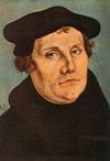Translation by Christoph Werner (Weimar, Thuringia) and Michael Leonard (Petaluma, California)
Martin Luther (1483-1546) is such an unparalleled figure in German, European and world history that it is difficult to do him justice in a short article.
After entering the monastery of the Hermits of St. Augustine in Erfurt (and later in Wittenberg), Luther was tortured almost to death by the question “how can I obtain God’s grace?” And what he had seen and experienced later in his travels to Rome only intensified that concern. For him and many people of his time the answer to that question was of such an importance that it can hardly be comprehended today. Was not the threat looming over Christianity that if one failed to obtain God's grace, eternal damnation, eternal agony in the fire of hell, eternal isolation from God would be the consequence? For the people at that time the danger was as real and as vivid as depicted in the religious images that could be seen inside and outside churches and public buildings. So it is not to be wondered that the Christians were prepared to do virtually anything to secure salvation, and the Church used this fear in wielding its power, which completely permeated everyday life as well as the whole late medieval society.
Luther's divergence from the teachings of the Catholic church grew with time. In the preface to the Latin edition of his collected writings, written one year before his death, he described his “tower experience“ as the decisive event that led him to a new understanding of man's relationship with God. In the south tower of the Augustinian monastery in Wittenberg he had brooded over the problem of reconciliation with God. Enlightenment came to him after a long inner conflict, in which he agonized, even despaired, over his inability to adequately live up to his Christian responsibility to perform good works. While meditating on The Letter of Paul to the Romans (1:17 and 3: 23-28), in which the Apostle declares, “For in it [i.e., the gospel] the righteousness of God is revealed through faith for faith: as it is written, ‘He who through faith is righteous shall live'”, Luther experienced an illumination that he later described as a kind of conversion. “It was as if the very gates of heaven had opened before me,” he wrote. He came to the conclusion that humans can contribute nothing to their salvation: Salvation is, fully and completely, a work of divine grace. Good works are the obvious consequence of God's acceptance of man's faith, not its prerequisite.
Luther explained Paul's doctrine of justification in his Heidelberg Disputation of 1518 in the following way: God's love does not find anything lovable in the humans, but creates it. God does not love the sinner because he is beautiful, but the sinner becomes beautiful through God's love.
Such opinions were bound to meet with the strongest opposition of the Church and evoke corresponding countermeasures. On the 3rd of January 1521 Luther was excommunicated by the bull Decet Romanum Pontificem (It Pleases the Roman Pontiff) of Pope Leo X.
In the course of his reformatory work Luther became a figure of national reputation, literally igniting the desire of the people, particularly the peasants - who at the time were held in a religious and political feudal servitude - to such a degree that it eventually brought about Luther’s own resistance, who feared that the uproar would endanger his reformation.
A decisive instrument for the furthering of his work was the German language, which he helped transform into the wonderful, sensitive and persuasive medium we make use of today as a matter of course. This was brought about by his translation of the bible into the German vernacular and his great polemic treatises from 1520: "On the Freedom of a Christian", "A Prelude Concerning the Babylonian Captivity of the Church", "An Open Letter to the Christian Nobility of the German Nation. Concerning the Reform of the Christian Estate”. Using the language of the Saxon Chancellery, based on east middle German, his translation was lively and vivid, incorporating all fields of culture and life and reaching a new stage in the formation of a unified German national language.
In view of Martin Luther's epoch-making achievements it is therefore deeply troubling to study recent issues raised in regard to his work. In his pamphlet "On the Jews and their Lies" (1543) he attacks the Jews on their religious beliefs and advises Christians first to set fire to their synagogues or schools and to bury and cover with dirt whatever will not burn, so that no man will ever again see a stone or cinder of them,
second, I advise that their houses also be razed and destroyed. For they pursue in them the same aims as in their synagogues. Instead they might be lodged under a roof or in a barn, like the gypsies. This will bring home to them that they are not masters in our country, as they boast, but that they are living in exile and in captivity, as they incessantly wail and lament about us before God,
third, I advise that all their prayer books and Talmudic writings, in which such idolatry, lies, cursing and blasphemy are taught, be taken from them,
fourth, I advise that their rabbis be forbidden to teach henceforth on pain of loss of life and limb,
fifth, I advise that safe conduct on the highways be abolished completely for the Jews. For they have no business in the countryside, since they are not lords, officials, tradesmen, or the like. Let them stay at home,
sixth, I advise that usury be prohibited to them, and that all cash and treasure of silver and gold be taken from them and put aside for safekeeping. The reason for such a measure is that, as said above, they have no other means of earning a livelihood than usury, and by it they have stolen and robbed from us all they possess. Such money should now be used in no other way than the following: Whenever a Jew is sincerely converted, he should be handed one hundred, two hundred, or three hundred florins, as personal circumstances may suggest,
seventh, I commend putting a flail, an ax, a hoe, a spade, a distaff, or a spindle into the hands of young, strong Jews and Jewesses and letting them earn their bread in the sweat of their brow, as was imposed on the children of Adam. For it is not fitting that they should let us accursed Goyim toil in the sweat of our faces while they, the holy people, idle away their time behind the stove, feasting and farting, and on top of all, boasting blasphemously of their lordship over the Christians by means of our sweat.
To be fair, Luther should not be judged solely in the light of today's knowledge and particularly of the experiences of the 20th century or reduce Luther simply to his anti-Semitism. Such wild eruptions and the language in which they were written might possibly be explained by the prevailing spirit of the time or by Luther's disappointment that the Jews would not be converted to the teachings of Jesus Christ or by the fact that he vehemently persecuted other people as well. But nevertheless, it remains an inexcusable abandonment, even betrayal, of the principles of his own faith in Christ's gospel of love.
Sources::
Die Bibel. Nach der deutschen Übersetzung Martin Luthers. (1952). Berlin: Evangelische Hauptbibelgesellschaft.
Streller, Siegfried. 1970. Hutten, Müntzer, Luther. Werke in zwei Bänden. Berlin und Weimar: Aufbau-Verlag.
Luther, Martin. 1543. Von den Jüden und ihren Lügen", gedruckt zu Wittenberg durch Hans Luft.
Daniel Krüger: Martin Luther.http://www.weimar-lese.de/index.php?article_id=186.
Christoph Werner: Luther und der Jude von Halle. http://www.halle-lese.de/index.php?article_id=102
The Jews and their lies: http://www.jewishvirtuallibrary.org/jsource/anti-semitism/Luther_on_Jews.html

![Martin Luther [en] Martin Luther [en]](/index.php?rex_media_type=contentBild&rex_media_file=mluther_kl.jpg)


